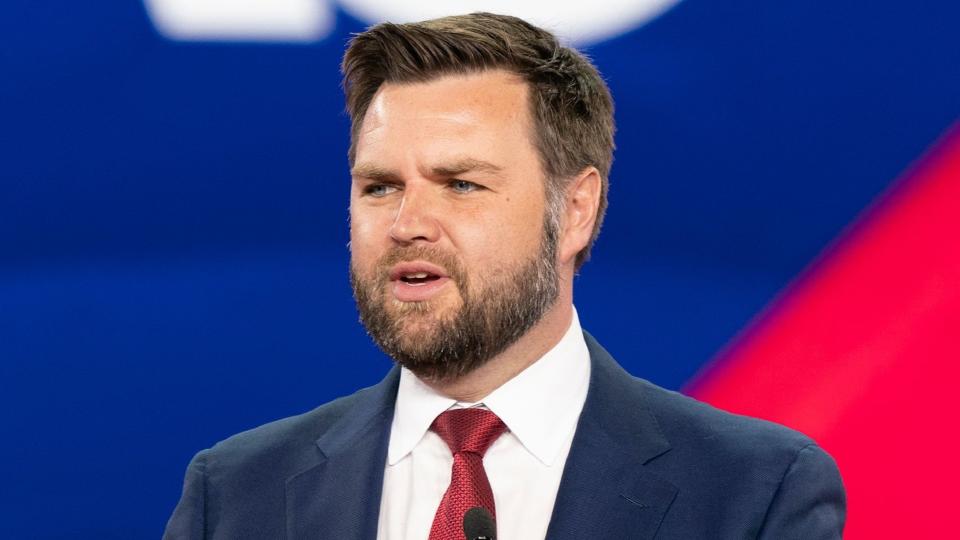4 Economic Policies of Trump’s VP Pick JD Vance That Can Help the Middle Class

On July 15, Newsweek opined that “J.D. Vance as VP solidifies Trump’s promise to revitalize the American middle class.” The Vance policy proposals and pet topics it chronicled all touched on the same concept — a rebirth of high-paying, hands-on jobs that favor on-the-job learning and certification over expensive university degrees.
For You: Here’s the Salary Needed to Actually Take Home $100K in Every State
Find Out: 7 Reasons You Should Consider a Financial Advisor — Even If You’re Not Wealthy
“Vance is committed to building a capitalism that benefits all Americans of all skill levels,” said Henry Olsen, a senior fellow at the Ethics and Public Policy Center. “That focus will ensure that people who work with their hands or on their feet benefit from innovation and growth, not just those who work with their minds on a laptop.”
Here are some other ways that the economic policies that Vance supports could help the middle class.
Wealthy people know the best money secrets. Learn how to copy them.
Vance Could Steer Policy Toward Investments in Domestic Blue-Collar Jobs
Much of Vance’s appeal lies in his intimate familiarity with the kind of working-class Americans who played an outsized role in delivering Donald Trump the presidency in 2016.
At the end of 2023, CNBC reported that blue-collar workers like miners, construction workers and loggers were in high demand and seeing their wages rise while the prospects for IT workers and software professionals dwindled, which the publication says “has taken a bite out of income inequality.”
However, after what the Bureau of Labor Statistics calls 40 years of blue-collar wage decline and millions of lost manufacturing jobs, it wasn’t nearly enough for Vance, who wants to incentivize, pressure and leverage U.S.-based businesses to stop outsourcing.
“His approach includes tax incentives for businesses that bring jobs back to the U.S. and increased infrastructure spending, which could create more stable, well-paying jobs,” said Dennis Shirshikov, who covers economic policy as a finance professor at the City University of New York.
Explore More: Here’s the Income Needed To Be in the Top 1% in All 50 States
He Bolsters Trump’s Trade War Against China’s Manufacturing Juggernaut
Trump’s first-term trade war with China — which he has vowed to expand if re-elected — used tariffs to make cheap Chinese imports more expensive and domestically produced goods cheaper and therefore more attractive both to American and foreign buyers.
Newsweek says Vance fully supports Trump’s tough-on-China policies as essential to bringing America’s working class firmly into its middle class.
“J.D. Vance emphasizes economic nationalism and the importance of restoring middle-class jobs through protectionist trade policies and reduced reliance on foreign manufacturing,” said Shirshikov, who is also the head of growth at real estate investment firm GoSummer.
China is home to roughly 1.4 billion people, more than four times the U.S. population, and according to global consulting firm McKinsey, 200 million Chinese will have reached upper-middle or high-income status by next year. Vance does not believe the American middle class and Chinese upper class can grow simultaneously under the current trade dynamic.
At the Republican National Convention, Vance said, “Together we will protect the wages of American workers and stop the Chinese Communist Party from building their middle class on the backs of American citizens.”
Vance Wants To Devalue the Dollar To Boost American Exports
The dollar has been exceptionally strong compared to most other world currencies, a dynamic that lets Americans buy more of the imports that dominate U.S. consumer culture.
Vance thinks the trend encourages China to flood the U.S. with cheap goods while making it impossible for domestic producers to compete with foreign competitors and create high-paying jobs at home.
Vance told Politico, “‘Devaluing’ [the dollar], of course, is a scary word, but what it really means is American exports become cheaper, and that’s important.”
He Links Rising Addiction Rates to a Diminished Middle Class
Vance’s public health policy interests — which Roll Call says include “opposition to abortion access and transgender health care” — are among his most controversial. However, one plank in his public health platform has wide-ranging bipartisan appeal: The idea that addiction — particularly that spurred by the opioid epidemic — is a direct threat to the American middle class.
For Vance, who Roll Call says draws “inspiration from his background as the son of an opioid addict, an experience he wrote about in his autobiography ‘Hillbilly Elegy,'” the issue is directly tied to his philosophy on blue-collar work as a ticket to middle-class prosperity.
“J.D. Vance’s focus on revitalizing American manufacturing and addressing the opioid crisis could have significant economic implications for ordinary Americans,” said Shirshikov. “By advocating for policies that promote domestic manufacturing, there could be a boost in job creation within this sector, potentially increasing household incomes in manufacturing-dependent regions. Additionally, addressing the opioid crisis could reduce healthcare costs and improve labor market participation by ensuring a healthier workforce.”
Editor’s note on election coverage: GOBankingRates is nonpartisan and strives to cover all aspects of the economy objectively and present balanced reports on politically focused finance stories. You can find more coverage of this topic on GOBankingRates.com.
More From GOBankingRates
6 Things to Try This Week if You're Behind on Your Savings Goals
4 Reasons Retired Women Need More Money Than Men -- And What To Do About it
This article originally appeared on GOBankingRates.com: 4 Economic Policies of Trump’s VP Pick JD Vance That Can Help the Middle Class